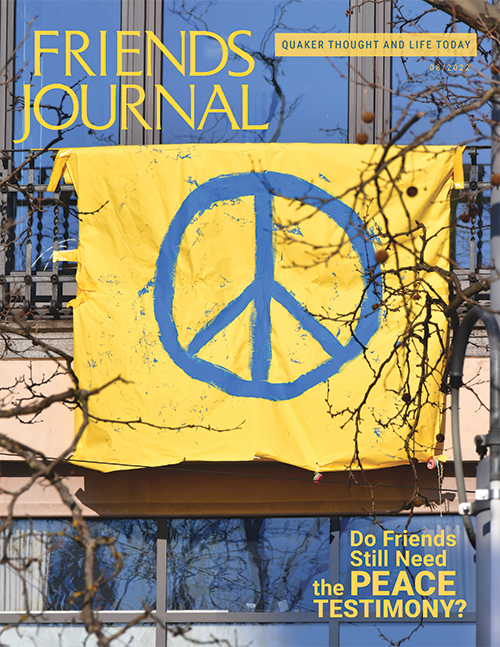We beseech thee—shriek!
Thank you to Gabriel Ehri for his comments in the June–July Friends Journal about a heartwarming exchange of words with an elder named Sybil at the meeting where he grew up, words that inspired him to deliver a rare (for him) message in a Friends meeting many years later. His comments brought back some very tender memories I have of Sybil, who helped me get acquainted with Friends as a new attender.
Sybil was beloved by everyone at University Friends Meeting in Seattle, Wash. Jewish from birth, she became a Friend at some point in her life; I do not know how that happened. One of her serious concerns was that people were not careful to have their messages heard by everyone. These are her words:
Friend, if thee feels moved to speak
In Meeting, we beseech thee—shriek!
Thee will be held in terms endearing
By those of us who are hard of hearing.
Sybil was always careful to speak correctly—not pedantically, just with respect for good words. She was known to have once been employed as a receptionist for a diaper service business (remember those?); whenever she had occasion to speak the word “diaper,” it always had three syllables.
Thank you for reminding me of Sybil!
Edna Dam
Vashon, Wash.
Listening to the stories of others
In most religious communities there are a few people whose life experiences have been among the low-income class (“Pour Out My Spirit” by Mary Linda McKinney, FJ Apr.). They only ask for one thing. After having listened to your stories of traveling across the country to visit nationally known parks, eating at world-class restaurants, and sleeping at the finest hotels, it would be nice if you, in turn, listened to their stories of traveling to a local state park to see the waterfalls, saving enough money to eat at their hometown’s most popular restaurant once a year, and enjoying a weekend visiting relatives in an adjoining state while staying in the basement for free.
And, oh yes, the water at the local beach is often just as fine as Myrtle Beach.
Charles “Buck” Bunner
Richmond, Ind.
I am college educated but, by choice, to accommodate my mental health needs, I have chosen part-time work for 90 percent of my adult life, and I’m single. My income is below the average White, college-educated female. I understand the sense that most Liberal White Friends don’t know what my choices mean in terms of what I can afford and can’t afford.
I have missed many annual yearly meetings because, even though there are meeting scholarships to help pay for the cost of yearly meetings, the fact I am an hourly worker means I lose money when I don’t work for a week.
I am also aware some Friends did not graduate college. Every time an adult education leader asks everyone to read aloud a section from the text we are discussing, it is assumed every adult Friend is fine with reading aloud. However, some of us have dyslexia, or are shy about reading aloud, or simply can’t read aloud easily, or maybe even have a high school, not college, level vocabulary.
Thank you to Friend Mary Linda for highlighting these assumptions that limit our interactions with each other.
Edna Whittier
Floyd, Va.
Spiritual challenges in our meetings
Thanks to Christopher Sammond for an excellent exploration of the challenges undermining the spiritual health of our meetings (“Utterly Naked Before God,” FJ June–July). I recently left a meeting I’d been attending for 28 years, discontinuing my membership. The only explanation I could give was that, to me, God was no longer at the center of our meeting for worship. Sammond’s essay expands this feeling and offers the solutions.
George Powell
Carmel Valley, Calif.
Sammond writes: “we need to take personal responsibility for helping to birth it, even if we personally are never called upon to speak.”
These words say exactly the responsibility that all members need to take for their meetings for worship. I say members because a first-timer attender, like I was nearly 60 years back, needs to experience a gathered meeting for worship if they are to be convinced of the value of a Quaker meeting for worship.
Rory Short
Johannesburg, South Africa
Clogging up the wheels
Thank you for the article on Bayard Rustin (“The Duty to Resist” by Carlos Figueroa, FJ Apr.), and for describing him as a man of deep commitment, and one guided by morals. Rustin was a master organizer and strategist. Moreover, he had a rebellious streak. Rustin once urged activists to be “angelic troublemakers,” and to get in the way like grains of sand in a set of gears: make it “so the wheels don’t turn.” These memorable phrases offer insight into what else guided Rustin, and how he came to be so effective as a leader and strategist, always rooted in faith. I highly recommend the film Brother Outsider as well as numerous books and articles about him, many of which you can find in the Friends Journal archives.
Karie Firoozmand
Timonium, Md.
The Ministry of Listening
Thank you for Paul Buckley’s “The Ministry of Listening” (FJ June–July). For some of us the ministry of listening may have a further dimension. Many Friends carry a sense of responsibility for the life of their meeting, whether through actual appointment or simply because of long participation or the level of their involvement. The listening might also need to be receptive to the needs of the speaker or guest (I love the concept of hospitality), and also to what the message is saying to the group.
There may be words which speak to the heart of living developments or concerns within the meeting, or which can offer healing of needs. Perhaps something is offered which could be of particular value to a Friend, whether or not present, who is engaged in some form of personal struggle, or undergoing sorrow. We may recognize that a thought or wording in the ministry is likely to jar with one or more Friends, who may need personal attention afterward, perhaps a quiet question, “How was it for you?”
As with our own reception, listening on behalf of the meeting is, as Paul says, not done by bringing a list of questions with which to examine the ministry. Such listening is likely to be embodied best, not by immediate responsive ministry, but rather by what happens after the close of the meeting. Can we come with heart and mind open, both for ourselves and for our community, to receive the seed of the ministry, and to be ready for the paths on which it might lead us in the ongoing life of the meeting?
Elizabeth Duke
Dunedin, Aotearoa New Zealand




Comments on Friendsjournal.org may be used in the Forum of the print magazine and may be edited for length and clarity.